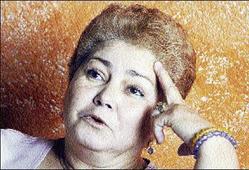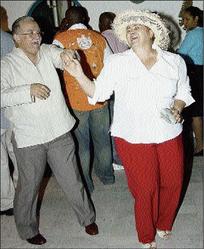
Ambassador of the Dominican Republic to Jamaica Filomena Navarro .- Ricardo Makyn/Staff Photographer
Filomena Navarro is happy to bet anyone $1,000 she makes no errors when writing in Spanish. An educator by profession, she says she owes such confidence to a preparatory school teacher who helped develop her skills.
Seņora Navarro began teaching at 18 years old, spanning nurseries to high schools and has had several articles on education published. Teaching Spanish and literature are her speciality.
The 50-year-old mother of two girls is on her third tour of duty, and second to Jamaica.
Raised in Santo Domingo, the Dom Rep's capital, she said there was a strong emphasis on education in her home. Making slingshots and playing baseball with the boys were also high on her list.
Currently, she's working on restarting an exchange programme between university students in Jamaica and the Dominican Republic.
Seņora Navarro also has plans to construct a park to celebrate the friendship between the countries.
SW: Why did you get into teaching?
FN: Because I love it. Since I was a child I liked to teach my friends how to do things. How to play baseball, how to build mud houses.
Did you always want to be a teacher?
No, not really, I wanted to be a journalist. In my country journalism is very deep in politics. It has to do with the political ideas you have. So I didn't want to mix both things.
What was it like growing up in Santo Domingo?
I have always been in love with my city. When I was a child Santo Domingo was more quiet than now. We had less people, today we have almost 10 million inhabitants and...there were less cars, more trees in the city and people used to live in a quiet way. It was the '60s, '70s, it was quite different.
Your country has a very high level of literacy, I think it's about 84 per cent. Was there ever a time when you were growing up when this was not so?
It wasn't. By the '70s maybe 70 per cent of the population was literate but what happened was in the first part of the 20th century people didn't care a lot to send their children to school and most of the illiterate persons that we have are (ages) 60, 80, 70.

Tour of DUTYwith SACHA WALTERS
What contributed to the change?
Since the '80s there's a law in my country that every family has to send their children to school at least until they finish high school. It's mandatory. So in the '80s they began a census to find out how many children of school age didn't go to school. Since 1992, we started a programme which I must confess I didn't believe a lot in at that time. We were supposed to see the result by 2002 and we really did. The education system in my country had a revolution, we began to review all the textbooks, review the school location to see if they have good buildings. We started what we call a national test. It's like CXCs, and let me tell you it's been amazing. The results of that plan funneled those people, 40, 30-year-olds that didn't know how to read.
You've been to Jamaica before and you've been here for a little while now. The fact that you've always been involved in education, what are some of the things you think we can do to improve our education system?
It's a difficult question because I'm not supposed to give opinions about internal things, but I was talking to the former minister of education here and I told her that the teaching of Spanish here, they're not doing it in the correct way. They teach Spanish in English. We teach English in English, we are not allowed to speak Spanish in the classroom (when teaching English or French). But here I've been to many schools and I've seen it. They cannot get into a Spanish atmosphere if they keep thinking in English and have to translate. The teachers here must be trained to talk only in Spanish.
We're in the Easter season and in Jamaica we have bun and cheese as one of our traditional foods. Any Easter food in the Dominican Republic?
Oh yes, we have a traditional dessert called havichula con dulce, it's sweet beans. It's prepared with coconut milk, spices, a little ginger, sweet potato. In 2004, I got a prize for it. In the United States they had this competition, and I sent that recipe and I got $150, I think.
Are there any other Easter traditions?
We have processions in the streets, with Christ and Magdelina and everything (a re-enactment of the crucifixion of Christ).
In Santo Domingo the procession goes to five different churches and we finish at the cathedral.
'Dom Rep' shorts
The Dominican Republic is one of the largest producers of cigars. It has over 600,000 acres of tobacco plants.
Discovered by Christopher Columbus in 1492.
Has a population of over nine million people.
Much like Jamaica, its economy is deeply rooted in tourism.

Dominican Republic Ambassador Seņora Navarro shows she still has the moves as she does the salsa with Venezuelan Ambassador Noel Martinez at the Dominican Republic's national day reception on Monday, February 25.

